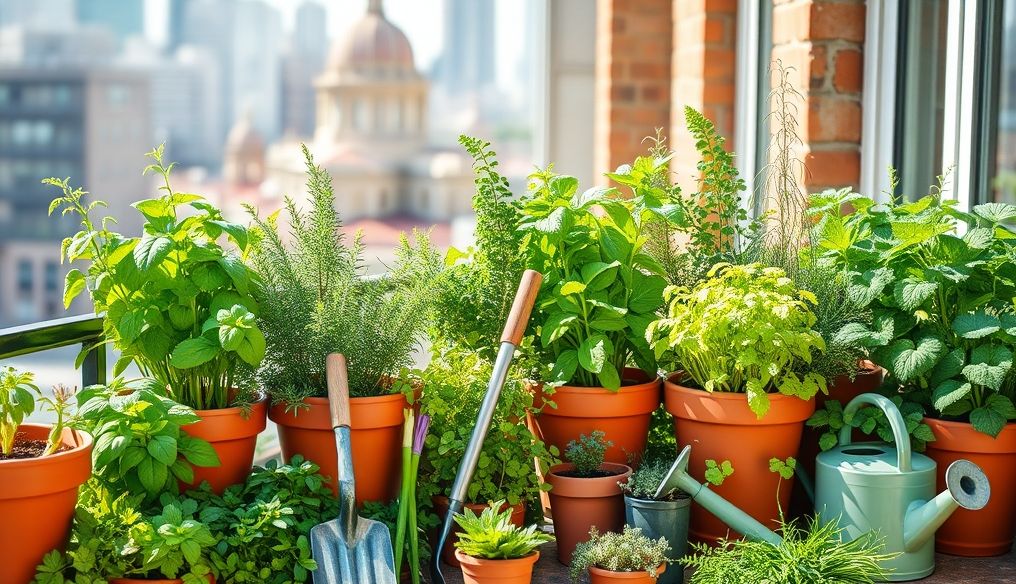Can I Grow Herbs on My Balcony and What Are the Best Ones?
Growing herbs on your balcony is not only possible but also a wonderful way to bring a touch of nature to your urban space, provide fresh herbs for cooking, and enjoy countless health benefits. In this article, we'll explore how to get started, which herbs thrive in containers, and how to care for them.
Why Grow Herbs on Your Balcony?
- Easy Access: Fresh herbs are just a few steps away!
- Save Money: Instead of buying expensive herbs from the store, you can grow your own.
- Eco-Friendly: Reduce your carbon footprint by avoiding the purchase of imported herbs.
- Aromatherapy: Many herbs have soothing and refreshing scents.
- Improve Air Quality: Plants in general help purify the air.
What Herbs Grow Well in Containers?
Not all herbs are suitable for container gardening, but there are many excellent options:
1. Basil
Basil is a versatile herb that grows well in containers. It needs at least six hours of direct sunlight per day and well-draining soil. There are many varieties of basil to choose from, such as sweet basil, Thai basil, and lemon basil.
Tip: Pinch off the tips of the stems regularly to encourage bushy growth and prevent the plant from setting seed too early.
2. Mint
Mint is a vigorous grower and can become invasive if planted in the ground. Therefore, growing it in a container is an excellent option. Mint needs moist soil and partial shade. There are many varieties of mint, such as peppermint, spearmint, and orange mint.
Warning: Plant mint in a separate container as it tends to spread quickly.
3. Rosemary
Rosemary is an aromatic perennial shrub that grows well in containers. It needs plenty of sunlight and well-draining soil. It is relatively drought-tolerant once established.
Tip: Don't overwater rosemary, as it is prone to root rot.
4. Thyme
Thyme is a low-growing perennial herb that is ideal for containers. It needs plenty of sunlight and well-draining soil. There are many varieties of thyme, such as English thyme, lemon thyme, and creeping thyme.
Tip: Prune thyme regularly to maintain its shape and prevent the plant from becoming woody.
5. Parsley
Parsley is a biennial herb that is typically grown as an annual. It needs moist soil and partial shade. There are two main types of parsley: curly parsley and flat-leaf Italian parsley.
Tip: Soak parsley seeds in warm water for 24 hours before planting to speed up germination.
6. Chives
Chives are a perennial herb with a mild onion-like flavor. They grow well in containers and need plenty of sunlight and well-draining soil. Chives also produce beautiful purple flowers.
Tip: Deadhead chive flowers to prevent the plant from setting seed and expending its energy on leaf production.
7. Sage
Sage is a perennial herb with a strong flavor. It grows well in containers and needs plenty of sunlight and well-draining soil. There are many varieties of sage, such as common sage, golden sage, and pineapple sage.
Tip: Prune sage regularly to maintain its shape and prevent the plant from becoming woody.
8. Oregano
Oregano is a perennial herb with a strong flavor that is widely used in Italian and Greek cuisine. It grows well in containers and needs plenty of sunlight and well-draining soil.
Tip: Oregano is relatively drought-tolerant once established, so avoid overwatering.
How to Grow Herbs on Your Balcony: A Step-by-Step Guide
- Choose the Right Containers: Use containers with good drainage holes. The containers should be large enough to accommodate the roots of the herbs you choose.
- Use High-Quality Soil: Use a container potting mix specifically designed for container-grown plants. Avoid using regular garden soil, as it can be too heavy and poorly draining.
- Choose a Sunny Location: Most herbs need at least six hours of direct sunlight per day. Choose a location on your balcony that receives the most sunlight.
- Plant the Herbs: Fill the containers with soil, then plant the herbs according to the package instructions. Be sure to leave enough space between the plants to allow them to grow.
- Water Regularly: Keep the soil evenly moist, but avoid overwatering. Check the soil moisture by sticking your finger into the soil. If the soil is dry to the touch, it's time to water.
- Fertilize the Herbs: Fertilize the herbs every two weeks with a balanced liquid fertilizer.
- Prune the Herbs: Prune the herbs regularly to encourage bushy growth and prevent the plants from setting seed too early.
Additional Tips for Balcony Herb Gardening
- Use Mulch: Apply a layer of mulch around the herbs to help retain moisture and suppress weeds.
- Protect Herbs from Harsh Weather: If you live in an area with harsh weather, protect the herbs from frost and strong winds.
- Monitor for Pests and Diseases: Inspect the herbs regularly for pests and diseases. If you notice any problems, treat them promptly.
- Enjoy Your Fresh Herbs: Harvest the herbs regularly to use in cooking, to make tea, or for other purposes.
Common Mistakes to Avoid When Growing Herbs on a Balcony
- Overwatering: Overwatering is one of the most common mistakes that beginners make. Overwatering can lead to root rot and other problems.
- Insufficient Sunlight: Most herbs need at least six hours of direct sunlight per day. If the herbs don't get enough sunlight, they will be leggy and unproductive.
- Using Poor-Quality Soil: Poor-quality soil can lead to many problems, including poor drainage and nutrient deficiencies.
- Not Pruning Regularly: Not pruning regularly can lead to herbs that are leggy and sparse.
- Ignoring Pests and Diseases: Pests and diseases can cause significant damage to herbs if they are not treated promptly.
How to Use Your Homegrown Herbs in Cooking
The best part about growing your own herbs is that you can use them in cooking! Here are a few ideas:
- Basil: Use basil in pesto, tomato sauces, salads, and Italian dishes.
- Mint: Use mint in tea, mocktails, desserts, and Middle Eastern dishes.
- Rosemary: Use rosemary with roasted meats, roasted vegetables, and potatoes.
- Thyme: Use thyme with soups, stews, sauces, and chicken dishes.
- Parsley: Use parsley as a garnish, in salads, or in sauces.
- Chives: Use chives in scrambled eggs, baked potatoes, and salads.
- Sage: Use sage with poultry, pork, and stuffings.
- Oregano: Use oregano in pizza, tomato sauces, and Greek dishes.
The Health Benefits of Growing and Consuming Fresh Herbs
In addition to being delicious, fresh herbs are also packed with health benefits. Here are a few examples:
- Basil: Rich in antioxidants and has anti-inflammatory properties.
- Mint: Can help relieve digestive problems and reduce nausea.
- Rosemary: Can improve memory and concentration.
- Thyme: Has antiseptic and antifungal properties.
- Parsley: Rich in vitamins A, C, and K.
- Chives: Rich in vitamins A, C, and K.
- Sage: Can improve memory and reduce menopause symptoms.
- Oregano: Has antibacterial and antiviral properties.
Conclusion
Growing herbs on your balcony is a wonderful way to enjoy fresh, flavorful herbs while reaping the many health benefits they offer. With a little planning and care, you can create a thriving herb garden on your balcony and enjoy its rewards all year long.




